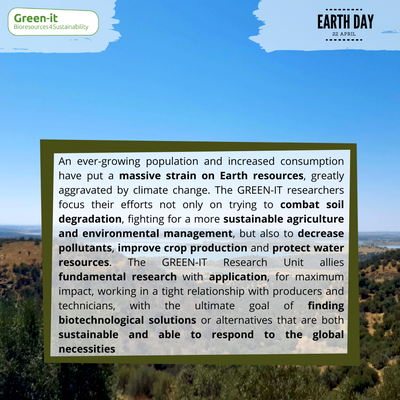Earth Day 2021
In the vast and unknown space, Earth gathers all the ingredients essential to life. Our “pale blue dot” has an estimated 8.7 million species of plants and animals, most still to be discovered. Humans have been around for 6 million years, but industrialization dates only from the 1800s. On our time on Earth, we have accomplished globalization and technological advances like never before. However, an ever-growing population and increased consumption have put a massive pressure on Earth resources.
In the last decades, the demands of our civilization for food, material and energy have led to an expansion of agricultural lands, mostly at the expense of forests, leading to a severe loss in biodiversity. About 50% of all habitable land is now used for agricultural purposes. Low crop rotation, intensive irrigation and monoculture, with an exhaustive use of chemical fertilizers and pesticides, were some of the trends that also rose in response to the increased demand. In consequence, we have seen soil erosion, eutrophication, salinization and agrochemical contamination.
On par, the existing demands for production of crops and livestock together with production of energy, industrial uses and human consumption have put a massive pressure on renewable water resources. At the current rate, estimates show that global water demand for all uses will increase by 20% - 30% by 2050, and global water demand for agriculture will increase by 60% by 2025. This is expected to bring on world-wide water shortages alongside a big loss of the Earth ecosystems.
Human activity also led to climate change, with its increased temperature and extreme weather events, aggravating the problems already caused by our own needs. 2011-2020 was the warmest decade recorded, a clear indication that our behavior is not sustainable for this Earth. To change our course of action and find solutions for a more sustainable future is now a major necessity.
 These global challenges have been one of the major targets of the scientific community, which has been gathering efforts in order to try and change the damaging course where we find ourselves. In the GREEN-IT Research Unit we look to contribute to solve these pressing issues. Our researchers focus their efforts not only on trying to combat soil degradation, fighting for a more sustainable agriculture and environmental management, but also to decrease pollutants, improve crop production and protect water resources. For this, GREEN-IT researchers look to comprehend the various relationships that embody the ecosystems, from the soil-bacteria-plant interactions, to the interactions between crops and their environmental conditions and the ties between trees, pests and pathogens. They also look to have a comprehensive view of the genetic and molecular landscape of traits of resistance and resilience to adverse (or stressful) conditions, but also of plant reproduction and nutritional value. The GREEN-IT Research Unit allies fundamental research with application, for maximum impact, working in a tight relationship with producers and technicians, with the ultimate goal of finding biotechnological solutions or alternatives that are both sustainable and able to respond to the global necessities.
These global challenges have been one of the major targets of the scientific community, which has been gathering efforts in order to try and change the damaging course where we find ourselves. In the GREEN-IT Research Unit we look to contribute to solve these pressing issues. Our researchers focus their efforts not only on trying to combat soil degradation, fighting for a more sustainable agriculture and environmental management, but also to decrease pollutants, improve crop production and protect water resources. For this, GREEN-IT researchers look to comprehend the various relationships that embody the ecosystems, from the soil-bacteria-plant interactions, to the interactions between crops and their environmental conditions and the ties between trees, pests and pathogens. They also look to have a comprehensive view of the genetic and molecular landscape of traits of resistance and resilience to adverse (or stressful) conditions, but also of plant reproduction and nutritional value. The GREEN-IT Research Unit allies fundamental research with application, for maximum impact, working in a tight relationship with producers and technicians, with the ultimate goal of finding biotechnological solutions or alternatives that are both sustainable and able to respond to the global necessities.
Science will play a major part in a more sustainable Earth but personal changes are also as important. Being more conscious of eating and shopping habits, opting for more sustainable options, being more mindful of our water use and avoiding the use of single-use plastics are some examples of small steps that can make a difference. Get more information on how to make a difference here.
April 22nd marks Earth Day, an annual event celebrated globally to support environmental protection. The 2021 theme is “Restore our Earth”, focusing on natural processes, emerging green technologies, and innovative thinking that can restore the world’s ecosystems.


